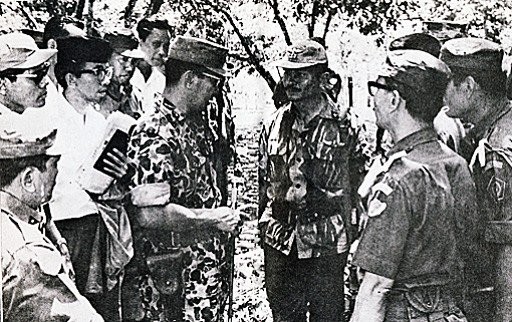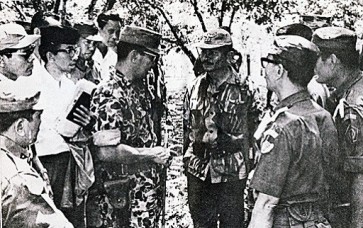Popular Reads
Top Results
Can't find what you're looking for?
View all search resultsPopular Reads
Top Results
Can't find what you're looking for?
View all search resultsConnecting the dots: Dutch research and court cases
Change text size
Gift Premium Articles
to Anyone
 A dark time -- Then Maj. Gen. Soeharto briefs members of the Army’s Special Forces (RPKAD, now Kopassus) prior to the removal of the bodies of the Army generals who were murdered during an alleged coup attempt on Sept. 30, 1965, which was blamed on the now defunct Indonesian Communist Party (PKI). As the most senior military officer available at the time, Soeharto led all the operations to restore security and impose order in the aftermath of the alleged coup attempt. (JP/30 Tahun Indonesia Merdeka)
A dark time -- Then Maj. Gen. Soeharto briefs members of the Army’s Special Forces (RPKAD, now Kopassus) prior to the removal of the bodies of the Army generals who were murdered during an alleged coup attempt on Sept. 30, 1965, which was blamed on the now defunct Indonesian Communist Party (PKI). As the most senior military officer available at the time, Soeharto led all the operations to restore security and impose order in the aftermath of the alleged coup attempt. (JP/30 Tahun Indonesia Merdeka)
T
o understand why the Dutch government has decided to fund a largescale investigation into the Indonesian independence war, we need to acknowledge the political impact of the court cases against the Dutch state.
It is extremely naïve to disconnect the two. This investigation may seem like an honest and brave attempt of the Dutch to finally take full responsibility for colonial atrocities.
However, the Dutch government has often expressed its wish to forget about the past in order to move on. Without the ongoing pressure of the court cases, the government would have unlikely financed further investigation.
Yet, instead of acknowledging the groundbreaking role of KUKB (Committee of Dutch Honorary Debt) chairman Jeffry Pondaag, the project leaders sidelined and ignored him. Why is that? I think this research is only a strategic move to convince the outside world that we, the Dutch, are doing great.
Quite telling, for instance, is a government report from 2004 entitled “To forget the past in favor of a promise for the future,” which focuses on the financial agreement of 1966. One year after Soeharto’s rise to power, the Netherlands managed to make a deal to let Indonesia pay for the loss of “its” businesses in Indonesia.
Soeharto was known as more pro-Western than first president Sukarno. Until today, the dominant view in the Netherlands is that, after Sukarno nationalized all Dutch companies in 1957, it was cruel of him to throw all Dutch out of Indonesia.
In this narrative, nobody seems to care whether these colonial “properties” were ever legally obtained to begin with. Take the 2004 report, the conclusion of which reads that it was normal for Indonesia to pay huge amounts of money to the Netherlands, since British ex-colonies had done the same.

















